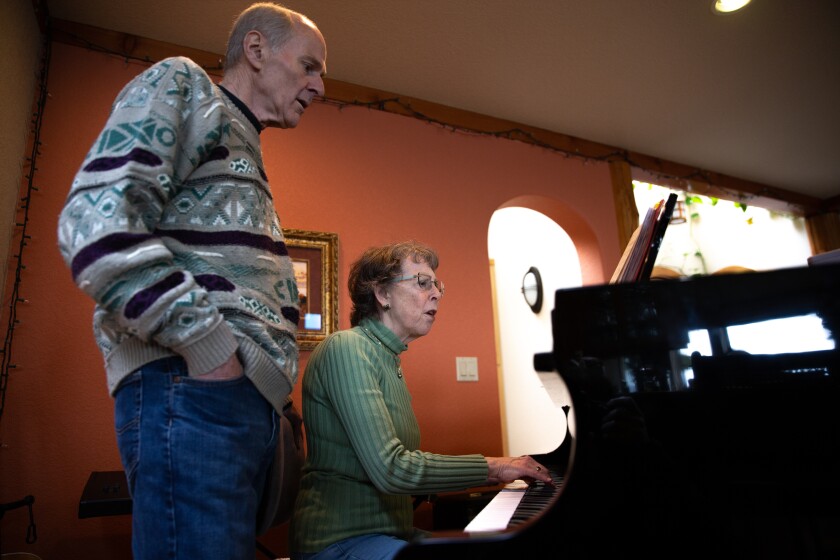
To my church family and friends,
Today's viral crisis has shown another church fellowship to be ill-informed.
Attending church worship or, going to church on special holidays, such as Lent or Easter this spring, has nothing to do with proving one's faithfulness to God but everything to do with accepting what modern medicine, virologists, epidemiologists, microbiologists, laboratory researchers, urban and rural regional planners, and public officials, are all saying together.
That Covid19 is not something to dare, show bravado over, prove ignorance about, or test its deadly effects. No. Until effective, proven, vaccines are developed and found safe for dispersal we are not safe as a society around one another. What we are to do is to follow acknowledged public protocols and policies such as practicing concerted social distancing.
Consider this surmise: It's not God who leaves us unprotected. He has given to us "special prophets," if you will. Men and women of wisdom who we might listen to, be taught, question, dialogue with, and together determine how to implement resultant personal, family, communal, and public practices along with any necessary subsequent societal planning. The tools are at hand. We are to use them.
We, as God's faithful, are therefore to follow God's "annointed disciples" of science and medicine. To trust the public institutions which have trained them, to acknowledge what they - and many other cross-over disciplines - are recommending. That those recommendations will be helpful in evaluating how an ancient faith based upon an ancient holy script, known as the Bible, might be read in the contemporary parlance of science and learning.
By updating one's faith and one's Bible will not invalidate God. In fact, it will testify to God all the more. I will attest to this fact in my own faith. But it will demand that we read of God and His Word in a more contemporary and relevant form according to the times we are living. A reading which may provide more congruence between faith and modern societies so that considered Bible truths are more in-line with common scientific knowledge, facts, and principles.
One's Bible faith is not being lost by doing this. No, it is being re-discovered, expanded, enhanced. It is learning to become a scientifically informed faith which may perceive God in larger terms. A God of greater complexity. A God who is deeply integrated with His creation and humanity beyond ways we can imagine.
Shunning, ignoring, or being unconversant with scientific perspectives has led to misunderstanding, or misperceiving, one's faith and beliefs. Boxing them into cubicles of magic and mysticism rather than properly into a science-informed language-construct which may teach of God and His cosmos in ways not considered before.
Good, grounded, belief does not need to defend itself. Rather, it should test itself so that God is never held back from whom He fully is and has revealed Himself to be. If science shows something different from the Bible then perhaps it has been our interpretation of God and the Bible that might rather be questioned than science. Pastors, teachers, theologians are not scientists. But they should be using the results of scientific study to inform themselves of their faith by asking better questions than they have allowed themselves to ask.
This can very difficult. I had asked these questions and discovered there was much about my faith which had to be rethought. Since that time of personal doubt and uncertainty has come an expanded (and I think, profitable) rethinking of my very fundamental and evangelical faith for some time now. The results? A picture of God which is much grander than I had expected. A Bible more helpful than imagined. A Christian witness which is more relevant to non-believers. And, in strangely familiar and warm way, a faith which has survived to live again to share, nourish, and feed, mind and heart, soul and body. Similarly, a lot of "nones and dones" are asking the church to do this very task. But until it is done sufficiently - and sufficiently well - they are left without a fellowship. Let's not let this continue to be the case.
In ancient times, Biblical narratives had no knowledge of today's contemporary sciences. They thought in profoundly different ways than we do today. The Bible in which we read of God is a Bible whose hoary narratives portray ancient multi-cultural eras, ancient thoughts, ancient superstitions, worldly ideas, and out-of-date knowledge with today's sciences.
We may continue to read the Bible's ancient narratives to learn grand spiritual truths of God and His communion with man and nature. A God of love. Of presence. Of care and nurture. This is the God of the Bible who is also supported by modern science. Who is uplifted over all creation when seen through eyes of faith and wonder enlivened by modern day academia. Science is not to be shunned but used. Integrated. Rewoven back into the faith narratives of the Bible to tell us of a God who is there though hidden by our out-of-date doctrines of faith and belief.
As God spoke and communicated with ancient humanity in the past so He continues to reach out to us today. Through people. Through our experiences. Through ready learning. Through beliefs and perceptions which are to be tested, tried out, verified, and questioned, so we are not misled by our interpretations and beliefs. The key is discerning God's voice from those who would mislead from Christ and His salvation in this world. At times this can be the church itself with its wildly outdated schemes and bravados. But under God we have a faith-world we may all participate in, share together, and find safety and help in times of crises as well as joy and thanksgiving in times of goodness. Yea Lord, help us hear again.
Peace,
R.E. Slater
April 1, 2020
Edited April 6, 2020
Edited April 6, 2020

* * * * * * * * *

IMPORTANT LINKS
CV19 Control and Prevention - https://www.osha.gov/SLTC/covid-19/controlprevention.html
CV19 Safety Rules for Work - https://www.osha.gov/SLTC/covid-19/standards.html




* * * * * * * * *
Ignoring Virus, an IL Church Held Services;
Now Most of the Congregation is Sick
by Hemant Mehta
March 27, 2020
On March 15, when COVID-19 concerns were well established in Illinois, The Life Church in Glenview, just north of Chicago, held a large event anyway. 80 people were present for an out-of-town speaker.
Now 43 of those worshipers are sick, including the pastor. And 10 of them have tested positive for the coronavirus — including the speaker, who is currently hospitalized.
Most of the people at the church haven’t been tested at all.
[Pastor Anthony] LoCascio, who has been pastor at the Life Church for 11 years, said he thought about whether to hold the service. But at the time, the number of confirmed COVID-19 cases was low and a stay-at-home order had not yet been imposed. Plus, he had an out-of-town speaker coming.
“We had a guest speaker. We were promoting it,” he said. “We made the announcement, ‘If you’re sick, stay home.’ We didn’t know. No one knew.”
Lots of people knew. Lots of people were dumb enough to ignore the advice of experts, though.
It was irresponsible of LoCascio to continue holding services when a virus was clearly threatening our way of life, as if the presence of God was somehow going to make everything all better.
It’s okay to skip church during a pandemic.
It’s okay to skip church, period.
You don’t have to go just because a pastor guilt-trips you into it. In this case, LoCascio put dozens of his own church members — maybe more — in harm’s way. God isn’t going to help.
* * * * * * * * *
A choir decided to go ahead with rehearsal.
Now dozens of members have COVID-19 and two are dead
By Richard Read, Seattle Bureau Chief
March 29, 2020
One of the authors of that study, Jamie Lloyd-Smith, a UCLA infectious disease
researcher, said it’s possible that the forceful breathing action of singing dispersed
iral particles in the church room that were widely inhaled. “One could imagine
that really trying to project your voice would also project more droplets
and aerosols,” he said.
 |
| Skagit Valley Chorale members Mark Backlund and his wife, Ruth Backlund, sing choir music Friday at their home in Anacortes, Wash., while convalescing from COVID-19.(Karen Ducey / For The Times) |
MOUNT VERNON, Wash. — With the coronavirus quickly spreading in Washington state in early March, leaders of the Skagit Valley Chorale debated whether to go ahead with weekly rehearsal.
The virus was already killing people in the Seattle area, about an hour’s drive to the south.
But Skagit County hadn’t reported any cases, schools and businesses remained open, and prohibitions on large gatherings had yet to be announced.
On March 6, Adam Burdick, the choir’s conductor, informed the 121 members in an email that amid the “stress and strain of concerns about the virus,” practice would proceed as scheduled at Mount Vernon Presbyterian Church.
“I’m planning on being there this Tuesday March 10, and hoping many of you will be, too,” he wrote.
Sixty singers showed up. A greeter offered hand sanitizer at the door, and members refrained from the usual hugs and handshakes.
“It seemed like a normal rehearsal, except that choirs are huggy places,” Burdick recalled. “We were making music and trying to keep a certain distance between each other.”
After 2½ hours, the singers parted ways at 9 p.m.
Nearly three weeks later, 45 have been diagnosed with COVID-19 or ill with the symptoms, at least three have been hospitalized, and two are dead.
The outbreak has stunned county health officials, who have concluded that the virus was almost certainly transmitted through the air from one or more people without symptoms.
“That’s all we can think of right now,” said Polly Dubbel, a county communicable disease and environmental health manager.
In interviews with the Los Angeles Times, eight people who were at the rehearsal said that nobody there was coughing or sneezing or appeared ill.
Everybody came with their own sheet music and avoided direct physical contact. Some members helped set up or remove folding chairs. A few helped themselves to mandarins that had been put out on a table in back.
Experts said the choir outbreak is consistent with a growing body of evidence that the virus can be transmitted through aerosols — particles smaller than 5 micrometers that can float in the air for minutes or longer.
The World Health Organization has downplayed the possibility of transmission in aerosols, stressing that the virus is spread through much larger “respiratory droplets,” which are emitted when an infected person coughs or sneezes and quickly fall to a surface.
But a study published March 17 in the New England Journal of Medicine found that when the virus was suspended in a mist under laboratory conditions it remained “viable and infectious” for three hours — though researchers have said that time period would probably be no more than a half-hour in real-world conditions.
One of the authors of that study, Jamie Lloyd-Smith, a UCLA infectious disease researcher, said it’s possible that the forceful breathing action of singing dispersed viral particles in the church room that were widely inhaled.
“One could imagine that really trying to project your voice would also project more droplets and aerosols,” he said.
With three-quarters of the choir members testing positive for the virus or showing symptoms of infection, the outbreak would be considered a “super-spreading event,” he said.
Linsey Marr, an environmental engineer at Virginia Tech and an expert on airborne transmission of viruses, said some people happen to be especially good at exhaling fine material, producing 1,000 times more than others.
Marr said that the choir outbreak should be seen as a powerful warning to the public.
“This may help people realize that, hey, we really need to be careful,” she said.